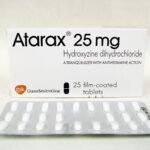Can You Take Hydroxyzine While Pregnant?

Almost every pregnant woman will face a decision about taking or using medicines before and during pregnancy. However, not all medicines are safe to take during pregnancy. Some medicines may cause birth defects, pregnancy loss, prematurity, infant death, or developmental disabilities.
Because many medicines may be unsafe during pregnancy, it’s always best to ask your doctor, midwife, pharmacist or dentist before you take anything. If you were taking any particular medicine before your pregnancy, you should also ask your doctor whether this is still OK to take now that you’re pregnant (or planning to get pregnant). For many medicines, there may not be evidence or research to be able to give a definite answer as to whether it is safe to take or not, so you and your doctor will need to discuss the risks and benefits of taking the medicine.
What is Hydroxyzine?
Hydroxyzine is in a class of medications called antihistamines. It works by blocking the action of histamine, a substance in the body that causes allergic symptoms. It also works by decreasing activity in the brain.
Hydroxyzine is used in adults and children to relieve itching caused by allergic skin reactions. It is also used alone or with other medications in adults and children to relieve anxiety and tension. Hydroxyzine is also used along with other medications in adults and children as a sedative before and after general anesthesia for surgery.
Can You Take Hydroxyzine While Pregnant?
Hydroxyzine should not be used in the first trimester of pregnancy. Studies that were done with mice and rats found an increased risk of birth defects. The risk to humans in the first trimester is unclear. Hydroxyzine may be used in the second and third trimesters of pregnancy, but it should not be used during or just prior to labor. Use of hydroxyzine during labor may increase seizure risk in infants, decrease fetal heart rate, and increase side effects when combined with narcotics.
Regarding breast-feeding, use is not recommended since hydroxyzine does pass into breast milk. Infants who have received other antihistamines have experienced drowsiness, irritability, or unusual excitement. In addition, it may lower milk production in the mother.
If you are planning on becoming pregnant, notify your healthcare provider to best manage your medications. People living with anxiety disorders who wish to become pregnant face important decisions. It is important to discuss this with your doctor and caregivers.
What Are Possible Side Effects Of Hydroxyzine?
Common side effects
• Dizziness, drowsiness, fatigue, dry mouth
• Urinary retention, blurred vision, confusion, irritability
• Headache
Rare/serious side effects
• Allergic reaction (difficulty breathing; hives; swelling of your lips, tongue or face)
• Increased heart rate, unsafe heart beat (long QT on ECG), confusion, hallucinations
• Priapism (an erection in males that does not go away after 4 hours)
Are There Any Risks For Taking Hydroxyzine For Long Periods Of Time?
To date, there are no known problems associated with the long-term use of hydroxyzine. It is a safe and effective medication when used as directed.
Physician should reassess periodically the usefulness of the drug for the individual patient.
Hydroxyzine Safety Information
Medicines containing the antihistamine hydroxyzine are available in most countries. The approved uses are different in different countries, but may include treatment of anxiety, relief of itching, use as one of the medicines given before an operation (premedication) or treatment of sleep problems.
- There is a small risk of altered electrical activity of the heart when taking these medicines, which can lead to abnormal heart rhythm or even cause the heart to stop (cardiac arrest). The risk is mostly seen in patients who already have heart rhythm problems or have risk factors for these problems.
- To reduce the risk to a minimum, new measures have been agreed for these medicines to ensure they are used for as short a time as possible at the lowest effective dose, and that their use is avoided in those at higher risk.
- The dose in adults should not add up to more than a total of 100 mg a day. Elderly patients should not use these medicines, but if they do, the maximum dose should be 50 mg a day.
- In countries where the medicines are approved for use in children, the maximum dose depends on their weight, and the daily total should not be more than 2 mg per kg of body weight in children weighing up to 40 kg (children over 40 kg should be given the adult dose).
- Hydroxyzine must not be taken by patients who already have disturbances of heart rhythm or are taking other medicines that can cause similar effects on the heart. It should be used with care if taking certain other medicines that slow the heart rate or decrease the level of potassium in the blood.
- Patients who have any concerns should speak to their doctor or pharmacist.





